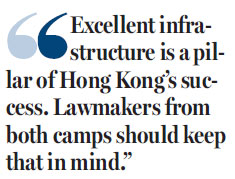We should remember merits of 'white elephant' projects
Updated: 2016-09-14 07:04
By Peter Liang(HK Edition)
|
|||||||
Peter Liang, citing examples, notes that the critics of infrastructure development often fail to see the long-term benefits of these projects
Some of the newly elected members of the Legislative Council may be too young to remember the controversies thrown up by several mega infrastructure projects.
The building of the Mass Transport Railway system, when proposed in the 1970s, was widely derided as a colossal waste of public resources on a, yes, "white elephant" project. There were the shrill cries from critics arguing passionately that it would be much more cost-effective to solve the projected traffic issues by building more roads and putting more buses and mini-vans on the streets.
Fast forward to the 1980s when the idea of building a new airport jutting out into the sea on reclaimed land was first proposed. It was immediately branded by the usual crowd of skeptics as a pipe dream of those bureaucrats who had nothing better to do with their time than to hallucinate in their cloistered offices. These critics argued that the existing airport, located in a densely populated urban district with no obvious room for expansion, was nevertheless good enough.

Now, everyone in Hong Kong - including those newly elected lawmakers from the opposition camp who have campaigned against most, if not all, of the major infrastructure developments under planning or in progress - shares in the social and economic benefits brought about by previously labeled "white elephant" projects.
In the past several years, opposition lawmakers have tried every trick permitted by LegCo's rules to create roadblocks in the funding of key infrastructure projects. In doing so, they have greatly worsened the problems that any project of such scale and complexity would normally encounter.
To be sure, there were isolated cases of mismanagement and incompetence involving construction of these projects. But the government and its principal contractors have identified these discrepancies and are working to rectify them. But these anomalies have continued to be exploited by the opposition lawmakers in the hope of winning political points.
Political analysts agreed that the large voter turnout in the LegCo election earlier this month has sent a clear message that Hong Kong people have had enough of the legislative stalemate that was a major drag on progress. They were voting for change more than anything else.
The outcome of the election hasn't changed the power structure in the council. But the newly elected opposition lawmakers - including the radical minority - who care to consider voters' moods would understand that they are charged with the responsibility of monitoring the government rather than sabotaging it. They can start by working with, rather than against, the government in ensuring that public works projects can proceed smoothly and in the interests of people whose livelihoods are affected by these developments.
Take the third airport runway for example. Despite the high cost, it is a project that is essential to coping with the projected increase in air traffic in passengers and cargoes and maintaining Hong Kong's status as the region's premier air transportation hub. Remember this. If the government then had succumbed to pressure and abandoned the new airport project, Hong Kong people would have to go to Shenzhen to take a flight to Beijing, Shanghai or Hangzhou. The old airport in Kai Tak would never have been able find room for expansion to accommodate the present flight frequencies.
It's really hard to find any valid reason to object to the third runway. It's not going to be built in anybody's backyard. Environmentalists have complained that the runway would encroach into the habitat of the Chinese white dolphin, which is an endangered species. But the government has repeatedly said that sufficient measures will be taken to minimize the disruption to these adorable mammals.
Some lawmakers-elect are dead set on opposing the building of these large-scale infrastructure facilities, arguing that money can be better spent on social benefits to help narrow the wealth gap. This is a false argument. Even if they choose to ignore the social and economic benefits of these projects, they have to realize that the excellent infrastructure facilities have always been a source of pride for Hong Kong people.
The SAR's excellent public transport facilities are the envy of the region. It's important to understand that its reputation is built on the highly efficient underground railway system.
Hong Kong people are proud to point out that their airport consistently ranks in the top three places in the world list. Of course, much of the credit should go to the management of the facilities. But not even the best management team can cope with traffic that exceeds the airport's maximum capacity.
Excellent infrastructure is a pillar of Hong Kong's success. Lawmakers from both camps should keep that in mind.
The author is a veteran current affair commentator.
(HK Edition 09/14/2016 page10)